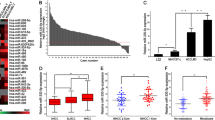Abstract
Introduction
Previous studies have reported that specific depletion of mammalian sterile-like kinase (MST1) in the mouse liver driven Hepatocellular carcinoma (HCC). However, how the expression of MST1 was regulated in the progression of HCC remains largely unknown.
Materials and methods
The expression of miR-3910 in the HCC tissues and cell lines were examined using q-PCR. The functions of miR-3910 in HCC were examined using MTT assay, Boyden chamber assay and soft agar assay. The effects of miR-3910 on the metastasis of HCC cells were evaluated using the mouse model.
Results
Here, we have shown that miR-3910 regulated the expression of MST1. MiR-3910 was up-regulated in HCC samples and cell lines, and the expression of miR-3910 was induced by the oncogenic RasV12. In the functional study, miR-3910 was found to promote the growth and migration of HCC cells, and knocking down miR-3910 inhibited the metastasis of HCC cells. Mechanically, it was found that miR-3910 activated YAP signaling by targeting MST1.
Conclusion
Taken together, this study demonstrated that miR-3910 exerted oncogenic effects on the progression of HCC and suggested that miR-3910 might be a therapeutic target for cancer therapy.





Similar content being viewed by others
References
Miller KD, Siegel RL, Lin CC, et al. Cancer treatment and survivorship statistics, 2016. CA Cancer J Clin. 2016;66:271–289.
Siegel RL, Miller KD, Jemal A. Cancer statistics, 2016. CA Cancer J Clin. 2016;66:7–30.
Wei W, Chua MS, Grepper S, So S. Small molecule antagonists of Tcf4/beta-catenin complex inhibit the growth of HCC cells in vitro and in vivo. Int J Cancer. 2010;126:2426–2436.
Calvisi DF, Ladu S, Gorden A, et al. Ubiquitous activation of Ras and Jak/Stat pathways in human HCC. Gastroenterology. 2006;130:1117–1128.
Fitamant J, Kottakis F, Benhamouche S, et al. YAP inhibition restores hepatocyte differentiation in advanced HCC, leading to tumor regression. Cell Rep. 2015;10:1692–1707.
Codelia VA, Irvine KD. Hippo signaling goes long range. Cell. 2012;150:669–670.
Badouel C, McNeill H. SnapShot: the hippo signaling pathway. Cell. 2011;145(3):484–484, e481.
Harvey KF, Pfleger CM, Hariharan IK. The Drosophila Mst ortholog, hippo, restricts growth and cell proliferation and promotes apoptosis. Cell. 2003;114:457–467.
Zhao B, Lei Q, Guan KL. Mst out and HCC in. Cancer Cell. 2009;16:363–364.
Chen X, Chen Y, Dong J. MST2 phosphorylation at serine 385 in mitosis inhibits its tumor suppressing activity. Cell Signal. 2016;28:1826–1832.
Rawat SJ, Araiza-Olivera D, Arias-Romero LE, et al. H-ras inhibits the hippo pathway by promoting Mst1/Mst2 heterodimerization. Curr Biol. 2016;26:1556–1563.
Elemeery MN, Badr AN, Mohamed MA, Ghareeb DA. Validation of a serum microRNA panel as biomarkers for early diagnosis of hepatocellular carcinoma post-hepatitis C infection in Egyptian patients. World J Gastroenterol. 2017;23:3864–3875.
Fu X, Wen H, Jing L, et al. MicroRNA-155-5p promotes hepatocellular carcinoma progression by suppressing PTEN through the PI3 K/Akt pathway. Cancer Sci. 2017;108:620–631.
Chen SY, Ma DN, Chen QD, et al. MicroRNA-200a inhibits cell growth and metastasis by targeting Foxa2 in hepatocellular carcinoma. J Cancer. 2017;8:617–625.
Ge H, Zou D, Wang Y, Jiang H, Wang L. MicroRNA-377 downregulates Bcl-xL and increases apoptosis in hepatocellular carcinoma cells. Oncol Res. 2017;25:29–34.
Mobus S, Yang D, Yuan Q, et al. MicroRNA-199a-5p inhibition enhances the liver repopulation ability of human embryonic stem cell-derived hepatic cells. J Hepatol. 2015;62:101–110.
Li S, Ran Y, Zhang D, Chen J, Li S, Zhu D. MicroRNA-138 plays a role in hypoxic pulmonary vascular remodelling by targeting Mst1. Biochem J. 2013;452:281–291.
Valero V 3rd, Pawlik TM, Anders RA. Emerging role of Hpo signaling and YAP in hepatocellular carcinoma. J Hepatocell Carcinoma. 2015;2:69–78.
He S, Zhang J, Lin J, Zhang C, Sun S. Expression and function of microRNA-27b in hepatocellular carcinoma. Mol Med Rep. 2016;13:2801–2808.
Zhang L, Xiang ZL, Zeng ZC, Fan J, Tang ZY, Zhao XM. A microRNA-based prediction model for lymph node metastasis in hepatocellular carcinoma. Oncotarget. 2016;7:3587–3598.
Tamori A, Murakami Y, Kubo S, et al. MicroRNA expression in hepatocellular carcinoma after the eradication of chronic hepatitis virus C infection using interferon therapy. Hepatol Res. 2016;46:E26–E35.
Childs-Disney JL, Disney MD. Small molecule targeting of a microRNA associated with hepatocellular carcinoma. ACS Chem Biol. 2016;11:375–380.
Perra A, Kowalik MA, Ghiso E, et al. YAP activation is an early event and a potential therapeutic target in liver cancer development. J Hepatol. 2014;61:1088–1096.
Bera R, Chiou CY, Yu MC, et al. Functional genomics identified a novel protein tyrosine phosphatase receptor type F-mediated growth inhibition in hepatocarcinogenesis. Hepatology. 2014;59:2238–2250.
Murakami Y, Toyoda H, Tanaka M, et al. The progression of liver fibrosis is related with overexpression of the miR-199 and 200 families. PloS ONE. 2011;6:e16081.
Amr KS, Ezzat WM, Elhosary YA, Hegazy AE, Fahim HH, Kamel RR. The potential role of miRNAs 21 and 199-a in early diagnosis of hepatocellular carcinoma. Gene. 2016;575:66–70.
Zhan Y, Zheng N, Teng F, Bao L, Liu F, Zhang M, Guo M, Guo W, Ding G, Wang Q: MiR-199a/b-5p inhibits hepatocellular carcinoma progression by post-transcriptionally suppressing ROCK1. Oncotarget 2017.
Author information
Authors and Affiliations
Corresponding author
Ethics declarations
Conflict of interest
There is no conflict of interest.
Ethical approval research involving animals
All applicable international, national, and/or institutional guidelines for the care and use of animals were followed.
Research involving human participants
All procedures performed in studies involving human participants were in accordance with the ethical standards of the institutional and/or national research committee and with the 1964 Declaration of Helsinki and its later amendments or comparable ethical standards.
Rights and permissions
About this article
Cite this article
Cheng, L., Wang, H. & Han, S. MiR-3910 Promotes the Growth and Migration of Cancer Cells in the Progression of Hepatocellular Carcinoma. Dig Dis Sci 62, 2812–2820 (2017). https://doi.org/10.1007/s10620-017-4670-3
Received:
Accepted:
Published:
Issue Date:
DOI: https://doi.org/10.1007/s10620-017-4670-3




